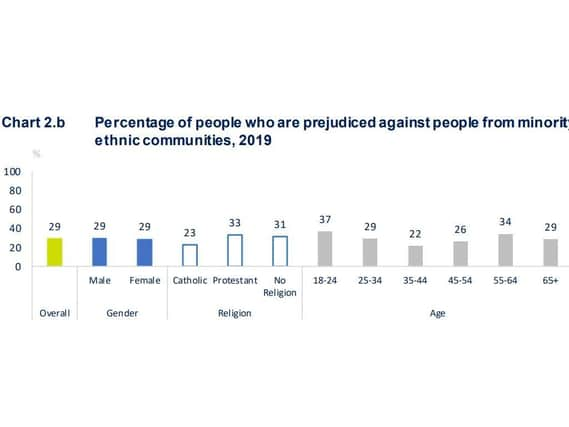29% self-report prejudice against minority ethnic groups with rise in racist incidents, crimes and bullying and harassment in schools


Racist incidents and crimes have also increased and more school pupils have reported witnessing racist bullying or harassment in their schools.
These are among the alarming findings contained in the ‘Northern Ireland Racial Equality Indicators Report: 2014 - 2019’ that was published by The Executive Office this morning.
Advertisement
Hide AdAdvertisement
Hide AdThe report presents data measuring the progress of the Racial Equality Strategy 2015 - 2025 on four key outcome areas: equality of service provision; combating prejudice, racism and hate crime; participation, representation, and belonging; and, respecting cultural diversity.
Under the category combating prejudice, racism and hate crime the report states that intolerance has been on the increase.
It states: "Overall, at 2019 the proportion of respondents reporting they were prejudiced against people from minority ethnic communities had increased significantly since the baseline and 2018 (2014: 24%; 2018: 20%; 2019: 29%).
"Compared with the baseline and 2018, in 2019 there was a significant decrease in the proportion of respondents thinking there is more racial prejudice against people from minority ethnic communities than 5 years ago (2014: 52%; 2018: 41%; 2019: 30%).
Advertisement
Hide AdAdvertisement
Hide Ad"The number of racist incidents reported has increased from the 2013/14 baseline (976) to 2018/19 (1,124); the number of racist crimes reported also increased (2013/14: 688; 2018/19: 699). In 2019 a significantly higher proportion of respondents reported they had witnessed racist bullying or harassment in their school than in the baseline year (2014: 39%; 2019: 45%)."
The report does find that there has been a decrease in the level of prejudice against some groups.
"Compared with the baseline (2014), by 2019, willingness to accept Eastern European, Irish Traveller and Muslims as residents, as work colleagues, or as family members, had all increased significantly. In 2019, acceptance of Irish Travellers was lowest when compared with each of the groups in these situations," it advises.
In terms of equality of service provision educational attainment is on the up for all groups but gaps in achievement and inequality of outcomes persist, the report finds.
Advertisement
Hide AdAdvertisement
Hide Ad"Since the baseline year (2013/14), by 2018/19 there has been an overall increase of around seven percentage points for both White and minority ethnic young people leaving school with 5 GCSEs (Grade A*- C): White: 86.5%; minority ethnic: 82.4%.
"By 2018/19 the proportion of White school leavers with no qualifications (0.6%) was similar to 2013/14 (0.7%); the percentage of minority ethnic school leavers with no qualifications had decreased from 5.8% in 2013/14 to 2.2% in 2018/19.
"Higher or further education continued to be the main destination for both minority ethnic (79.2%) and White (74.7%) school leavers in 2018/19," the authors state.
Advertisement
Hide AdAdvertisement
Hide AdPeople from minorities are more likely than white people to have white collar jobs or work in the professions, is another finding, although the data are old and need updating.
"At the 2011 Census, 30.2% of minority ethnic people were in ‘Managerial’ or ‘Professional’ occupations; compared with 25.8% of White people," the report notes.
The report also analysed the participation of people from minority groups in public life in the north.
"Compared with the baseline, in 2019 there was a decrease of 14 percentage points in the proportion of respondents who thought that minority ethnic people participated ‘a little’ or ‘a lot’ in public life (2014: 71%; 2019: 57%).
Advertisement
Hide AdAdvertisement
Hide Ad"Overall, there was no significant change in the proportion of respondents who believed organisations and leaders should encourage members of minority ethnic communities to participate in public life (2014: 67%; 2019: 64%); however, this was a significant decrease on 2018 (69%).
"A significantly higher proportion of respondents aged 16 years in 2019 (62%) said they socialised or played sport with people from a different ethnic background than in 2014 (54%)," it found.
Finally, the report looked at respect for cultural diversity and found an improving picture.
"Since baseline there was no significant change in the percentage of respondents who agreed that the culture and traditions of the minority ethnic community added to the richness and diversity of Northern Ireland (2014: 59%; 2019: 61%); however, the position at 2019 was a significant decrease on the year before (2018: 65%).
Advertisement
Hide AdAdvertisement
Hide Ad"Overall, there was a significant increase in the proportion of respondents who agreed that the culture of Irish Travellers is more respected than it once was (2014: 18%; 2019: 25%); the position at 2019 was also significantly higher than in 2018 (18%).
"In 2019, the percentage of people with friends from minority ethnic communities (53%) was higher than the baseline position (2014: 42%)."
Comment Guidelines
National World encourages reader discussion on our stories. User feedback, insights and back-and-forth exchanges add a rich layer of context to reporting. Please review our Community Guidelines before commenting.